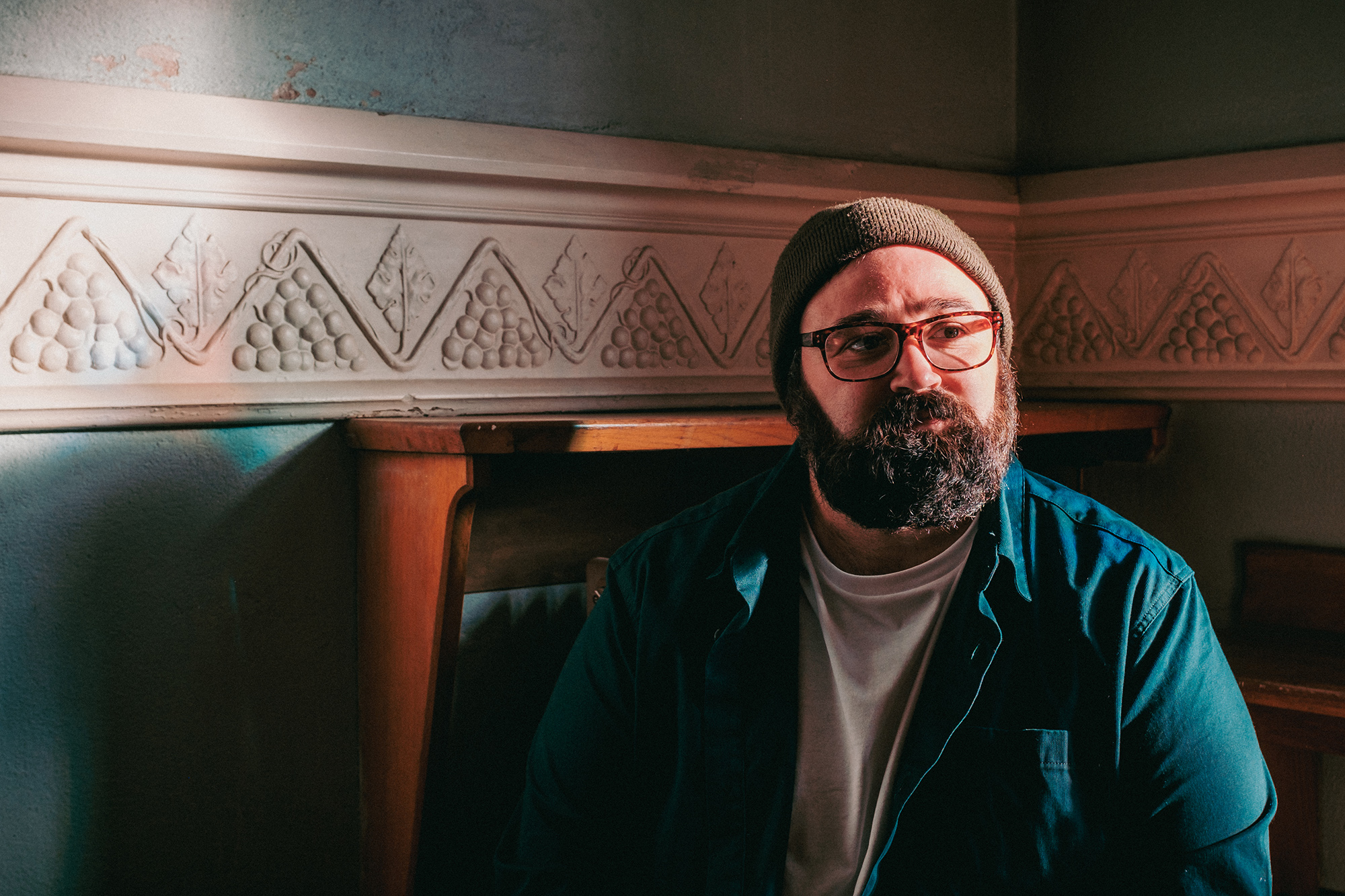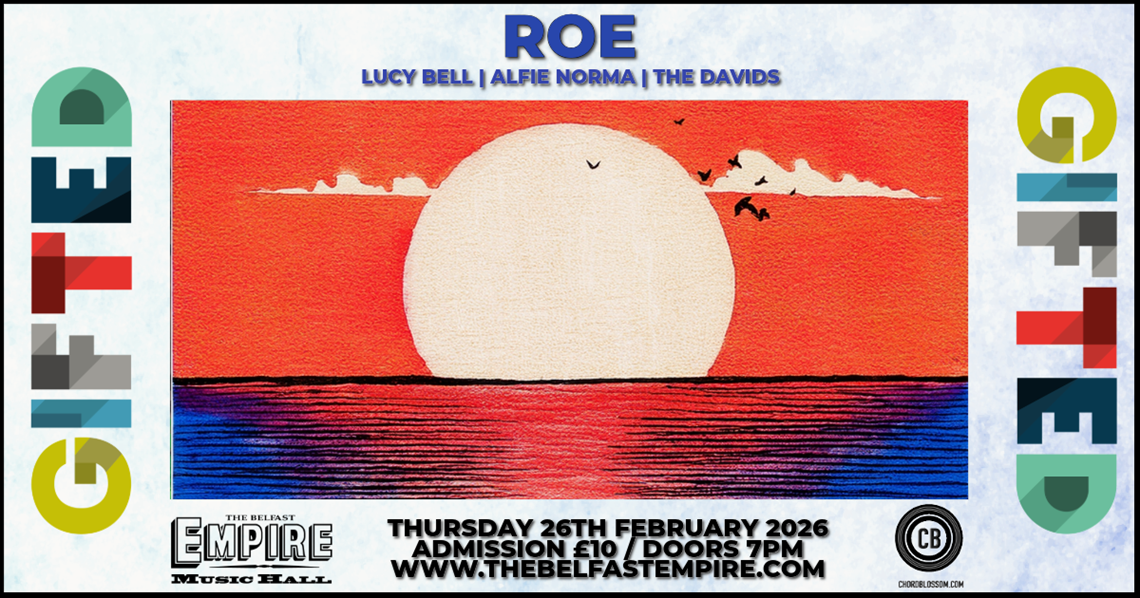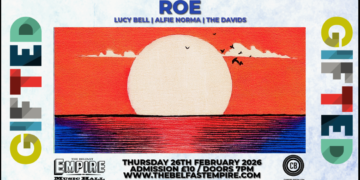Released as September turned to October, Amelanchier is the debut album from FRMR, known in other circles as Andrew Farmer. Farmer is perhaps best known from his time with Sons of Caliber, but the last few years have birthed a calmer, more meditative solo sound. Indeed, Amelanchier is an album of depth and texture, informed by the landscape and a rural upbringing. This all comes to pass in spoken word poetry, stirring folk songs and some gorgeous instrumentation and compositions. It has the sound of an album that has had a lot of thoughtfulness and heart poured into it, making for a beautiful listen.
From first listen, Amelanchier set out enough intrigue to ask FRMR to give us meaning, insight and feeling behind his debut album. His thoughts below should be cause for even further repeat listening.
Reubens Glen
‘Reubens Glen’ is a small wooded valley situated close to where I grew up in Mid Ulster. It sits in the townland of Cranagh/Cranny which means abounding in trees. The Glen is part of an old carriage road that was used in the 17th century to link the towns of Draperstown and Moneymore. To me it’s a thin place (a metaphor often used to describe somewhere where the great divide between this world and the next is at its thinnest). It’s a spot that I have revisited many times over the years to find inspiration.
I am drawn to it because of its forgotten and almost timeless nature. It’s a wild place, with storm stricken trees and endless layers of fallen leaves. I like to imagine those who would have traversed along its banks years ago and who may have spent a night sheltered in its embrace. The glade is full of oak and many other native species of trees and there’s a stream that runs through its heart. Scoring a short piece like this can often be more difficult than scoring one much longer. I like what Jude Moses did with it, it subtly carries the spoken words to their destination without distraction and I felt like it was a natural choice to begin the journey through this album.
Inver
In many regards ‘Inver’ set the tone for the rest of the record. I’ve been experimenting more and more with samples and electronic music over the last few years and I feel like this song embodies that commute. The synth and the unrelenting sub take centre stage throughout the track, but we kept the acoustic throughout the mix to root the melody and reference my folk origins.
One of my favourite elements in the production is the articulated reverb that my producer Mike Mormecha uses on the symbols towards the ending. There are points where they could almost be mistaken for lasers or something from early sci-fi. I use a sample of children imitating sirens, which I recorded one day whilst out walking with my nieces. We came across an old band stand which had a deafening echo, and they just started singing and imitating the sounds around them. I always keep my zoom recorder close to hand when I’m out and about to collect such sounds.
Sea Holly
This track is loosely based on transcendental meditation and my own personal meditative practice. Fundamentally ‘Sea Holly’ is a song about waiting and the process of learning to mute the noise of this dizzying world. Conor Scullion played all the synths remotely for this track. He sent me so many amazing options to play with, I think we ended up using almost all of them. It’s a full sound for sure, and the song doesn’t wait around to reach its conclusion. The bass licks in this track were some of my favourite to play. I don’t always use bass as bass, I sometimes just incorporate it as a lead instrument to voice notes like another layer of harmony. Bass was the first instrument I ever learned to play and I still tend to gravitate towards during the writing process.
Roaming
On our family farm there was an old water pump in the yard. It was a prominent feature not just practically but also architecturally and visitors would often refer to it when visiting our home. It was fairly functional and would be used from time to time for small instances when a limited amount of water was required for a job. Operating it was hard work and I did not envy those in the past for whom it was their only means of attaining water.
Throughout my writing I endlessly investigate spirituality, mental health and the inner workings of the mind. In some regards I see all of these subjects as the same. In this poem I liken the balancing of serotonin levels in the brain to that of pumping for water, and pose questions about the origins of happiness, our chemical makeup and our ability to control our feelings.
Lark
This record is dedicated in its entirety to my great grandfather Robert Houston. He appears throughout various tracks in numerous guises, in ‘Gospel Oak’ he walks the roads, in Amelanchier he ploughs the earth and in this song he is by all means the protagonist, the one who rises with the lark. My grandmother told me once that he would often douse his face with cold rainwater in the mornings, drawn from a wooden barrel that sat at the back door of the house. Not out of a lack of facilities indoors, but in a bid to reset his nervous system; a practice not unlike sea swimming I suppose. This image has haunted me ever since, as I’ve often thought about his daily struggle. A man who could play the fiddle upon occasion, he spent his days labouring and working the ground endlessly to provide for a wife and nine children. In this song I particularly love the keys section between the last chorus and the motif. If I had to describe this track to someone stylistically I would say— Blade Runner meets Thomas Hardy.
Paraclete
A song about solitude and the joys of foraging wild hedgerows for groceries. ‘Paraclete’ was originally destined for the next record but an opportunity to record it live with the Ulster Orchestra last year saw it enter earth’s atmosphere, somewhat before its time. This gave us the freedom to experiment with the studio version and push the boundaries in production. Someone described this version of ‘Paraclete’ to me as akin to meeting an old friend in town on a night out in their fancy clothes.
At its heart this is a heavy and deeply melancholy song, so offsetting that with the light instrumentation was important. It drops where the live version lifts and we use the beat in a counter intuitive fashion to stabilise the progression throughout. Rachael Boyd’s vocals add such a rich nuance. The last cycle of the motif has a distorted lead riff played on what sounds like an electric guitar, but I actually played this on bass. This riff differs too from the live version of the song. I just felt like it needed to be reimagined slightly.
The Moy
Although not strictly about this geographical location, this poem takes its name from a small village in County Tyrone where my paternal grandfather’s side of the family came from. It looks at language and speech and how the very land itself shapes the sounds we make. It mourns the loss of so many place names that were anglicised. I use a rain sample throughout this track to convey our longstanding and tumultuous relationship with elements. The instrumentation towards the end is a remixed synth section I borrowed from ‘Sea Holly’. I wanted to portray the sense of resilience found in the people of this island and reflect our affiliation with the coast.
Gospel Oak
Trees have been used as meeting places for centuries in Ireland. People would use them to gather under, waylay information, perform nuptials and mark boundaries. A large tree was often a great landmark for travellers too. Folklore even suggests that a tree was considered a witness to the happenings that took part under its branches.
On my last trip to London I noticed the ‘Gospel Oak’ stop on the underground train, and read that this area was historically named after a tree where people met for public discourse and healing. I use this oak symbolically in the song as a focal point where many versions of the self are gathered. We spent more time mixing this track than any of the others. Some of the lines I speak rather than sing; symbolically this acts as a bridge between the songs and the spoken word and unifies the two strands of the record.
My brother Timmy sings the harmony in the chorus. I love his voice, he almost has a rock ballet tone in this track.
Knitting & Kicking
I was 12 when I wrote my first poem. I had just started “big school” and there was a poetry competition for every year group. Somehow my poem was selected as the best written by a boy in year 8. The poem was titled The Fox. I can only remember the first line of it but it generally involved stealing a chicken to feed hungry cubs.
My prize was that I got to read it at the school open night later that year, but to be honest this felt more like a punishment for a shy farm boy who had accidentally written a good poem. Other than The Fox, I think ‘Knitting and Kicking’ is the best thing I’ve ever penned and I’m really proud of it.
There is no substitute for a mother’s love. And by ‘mother’, I’m not referring to an individual, I mean the maternal instinct. The predisposition to nurture, to care, to love beyond measure and sacrifice without reproach. Maternal love comes in many shapes and sizes, embodies many forms and is the most universal language of all. I hope this poem moves people.
In my experience, collaborating with the right people has only ever made my music better and gave it extra dimensions. Rachael Boyd has worked with me on a number of projects and she is an incredible composer, she did an amazing job with this score and I’m a big fan of her work. As ever, I really just let her make this production her own. I don’t hold onto my songs and poems too tightly, they don’t belong only to me and I see myself as merely a caretaker.
Amelanchier
This was originally called Hands in the Dirt and is the oldest song in the record. I think it was the last Sons of Caliber song I wrote. I was fairly burnt out from playing and touring at the time and the lyrics definitely reflected my fatigue. I didn’t have a chance to record it then, so I felt it was a good place to start this new project.
We experimented with this track quite a bit instrumentally. Eventually we landed on this stripped down version recorded with an old nylon string guitar that Mike had in the studio. I love the almost haunted feeling the screeching symbols create. My dad and my two brothers did the high harmonies and Jude Moses did the lows remotely from Charlotte, NC. I tend to build my songs around my lyrics and I like to keep vocals at the forefront of the mix. My old friend the fox gets a mention in this track as well.
The Grange
‘The Grange’ is named after The Granger Water river which flows through the village where I grew up; Desertmartin, (meaning “hermitage of St Martin”). The nameless stream that trickled through our farm was one of its many tributaries, but its origin was in Slieve Gallion, a magnificent mountain poised in The Sperrins. It featured much throughout my childhood. My brother and I would spend endless hours at this river, fishing for sticklebacks with jam jars, catching frogs and jumping from one side to the other when it flooded and the risk of falling in was so much more prevalent. The Grange also features in ‘Gospel Oak’ as a place of respite and restoration. The river sits just below an old ecclesiastical site from the 6th century that allegedly was used as a retreat by St Columba. Luke Bannon took the reins on the arrangement on this one, I love the dissonance of the strings and arpeggiation. This poem felt like a natural closer for the album. In some regards it’s almost like a motivational speech, wishing people good luck in their future endeavours.








